Argentines, who have been grappling with some of the most crushing inflation rates on the planet, are now riding a rollercoaster of emotions—hope tinged with deep exhaustion—as monthly price hikes have finally dipped to their lowest point in over two years. This fleeting respite comes at a steep cost, thanks to the fierce austerity measures introduced by President Javier Milei.
In July, inflation dropped to 4%, a figure that might seem like a miracle in a land where financial nightmares have become the norm. Argentina’s INDEC statistics agency announced this on Wednesday, marking the lowest inflation rate since early 2022. But don’t be fooled by this seemingly good news—inflation for the past year still skyrocketed to a staggering 263%, clinching the title of the world’s highest.
The country is clawing its way out of a brutal economic meltdown, the very crisis that catapulted the libertarian firebrand, Milei, into power last year. Desperate for a change, voters turned to this unconventional outsider, banking on his radical strategies to pull Argentina back from the brink.
Milei’s relentless cost-slashing has thrown a lifeline to the state’s battered finances and allowed the central bank to catch its breath and rebuild reserves. Inflation has, indeed, been subdued, but the economy is paying a heavy price. Recession has gripped the nation, and subsidy cuts have sent the prices of essential goods and services spiraling upward. Poverty, already rampant, has surged even further.
“I’m exhausted, but this feels different—like maybe, just maybe, things might turn around,” says Miguel Jamui, a 69-year-old retiree, reflecting the cautious optimism of those who see a glimmer of hope in Milei’s unorthodox approach.
Under Milei’s watch, monthly inflation has plummeted from over 25% last December to 4% in July. Yet, the country’s economy is teetering, with the recession deepening and cuts to subsidies making life even harder for the average Argentine.
Despite the dip in inflation, many Argentines feel their wallets are shrinking. Poverty is now choking half the population, with over seven million children trapped in its grip, as highlighted by a recent UNICEF study.
The Milei administration insists that fiscal discipline is the bitter medicine needed to heal the economy, warning that the road ahead will be rocky before it smooths out.
“I’m still having to tighten my belt because of this economic crisis,” admits Maria Ruiz, a 43-year-old teacher, her voice tinged with frustration. Standing near Buenos Aires’ iconic Obelisco, she watches as stores offer frantic promotions to lure in shoppers—yet, it’s a struggle that feels Sisyphean.
“It’s like every time you think you’ve got a handle on things, life knocks you down again,” Ruiz sighs. “I see the shopkeepers doing everything they can—promotions, discounts, whatever—but honestly, it’s just not enough.”

